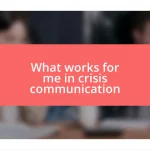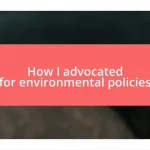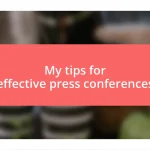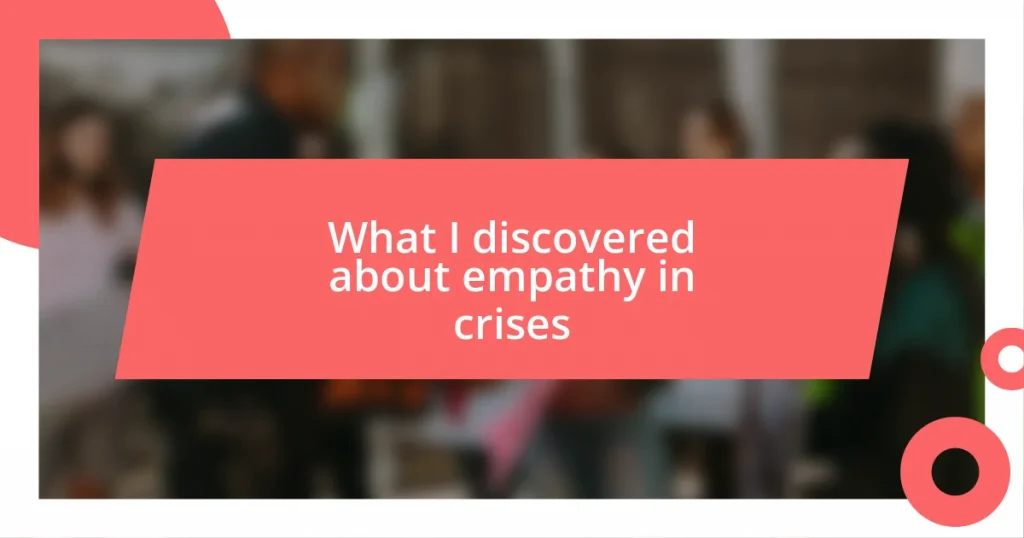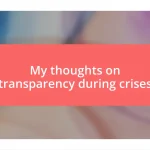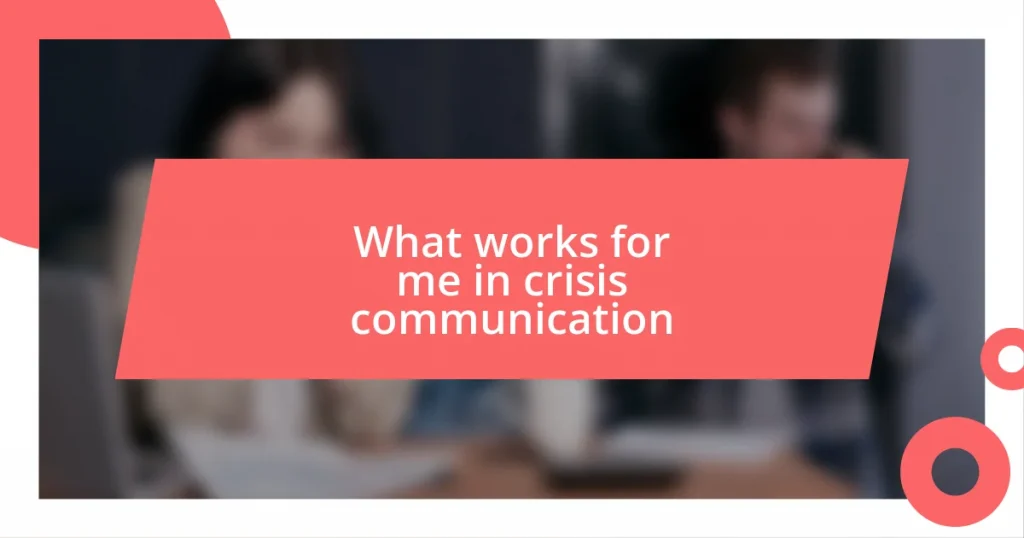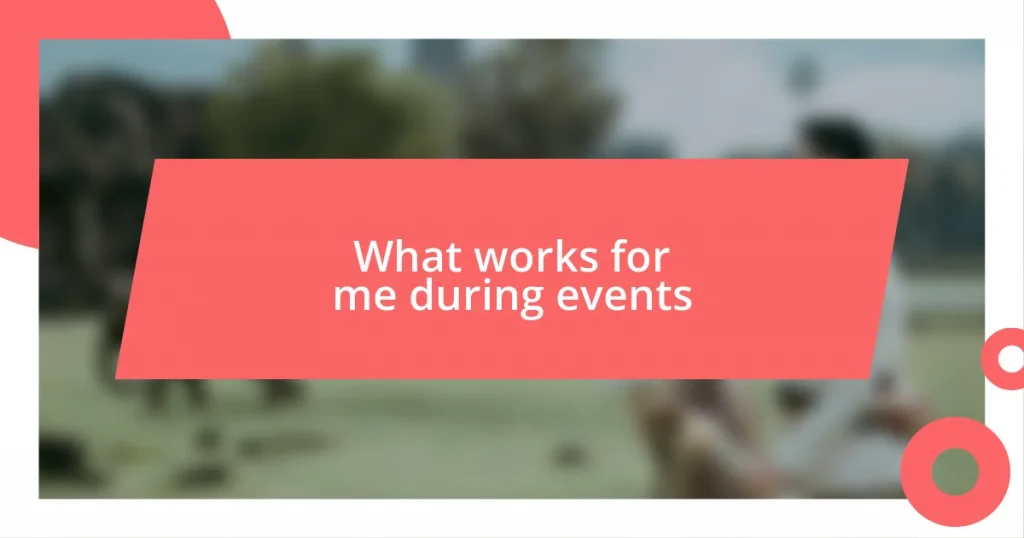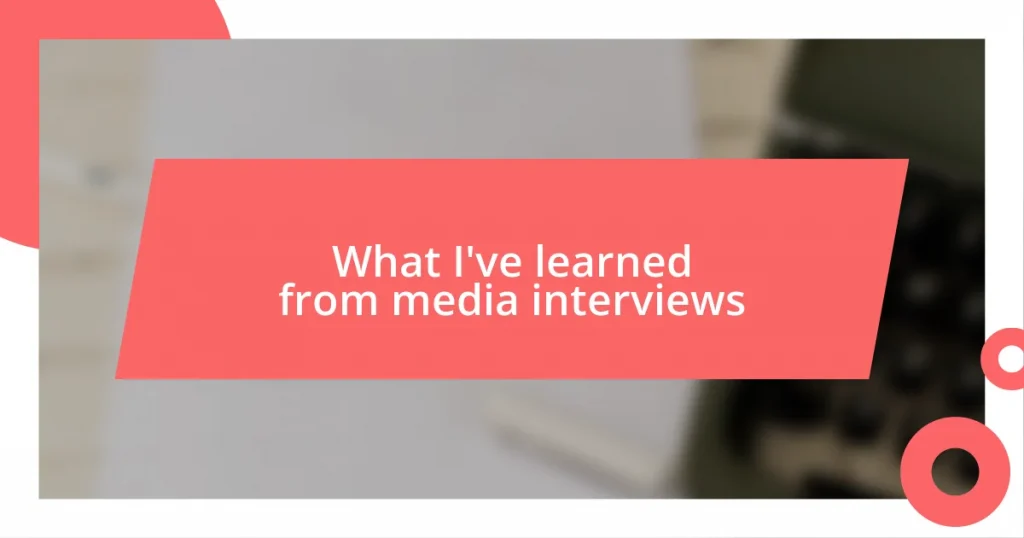Key takeaways:
- Empathy creates connection and healing during crises, allowing individuals to share experiences and support one another in times of despair.
- Identifying emotional needs is crucial; sometimes, individuals require emotional support rather than practical help, highlighting the importance of active listening and presence.
- Overcoming barriers to empathy, such as preconceived notions, emotional fatigue, and fear of the wrong words, can lead to authentic connections and deeper understanding.
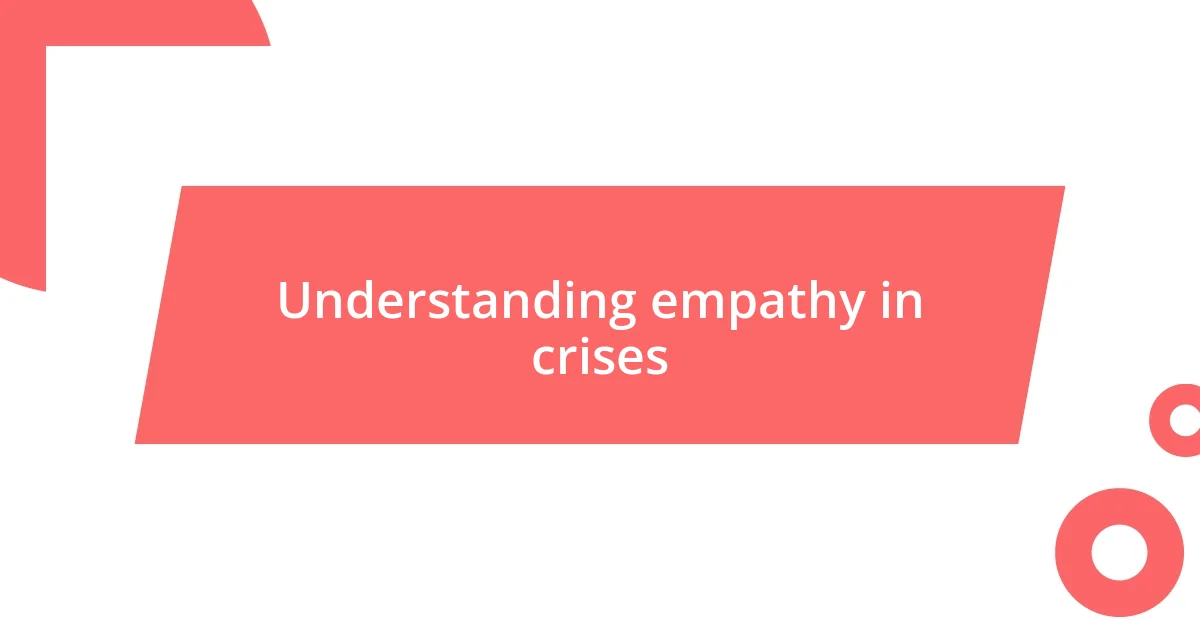
Understanding empathy in crises
Empathy in crises serves as a vital bridge that connects us when emotional barriers might otherwise prevail. I remember a time during a community disaster when a neighbor lost everything. Instead of distancing ourselves, we gathered around, listening and sharing their grief. That shared experience of sorrow created a powerful bond, reminding me just how crucial empathy is in moments of despair.
When we experience crises, it’s easy to fall into the trap of focusing solely on our own pain and needs. But I’ve found that reaching out to others can create a sense of collective healing. Have you ever noticed how simply validating someone’s feelings can lighten a heavy heart? It’s fascinating to see how empathy not only aids the one in distress but can also transform our own experiences, filling the void with a sense of purpose and connection.
In these tumultuous times, practicing empathy can feel like a challenge, yet it’s often the most natural reaction I observe. Moments spent with those affected by crisis often leave me reflecting on what it truly means to be human. This makes me wonder—why do we hesitate to express empathy when it comes so instinctively at other times? The realization that genuine understanding can foster resilience is something I cherish deeply.
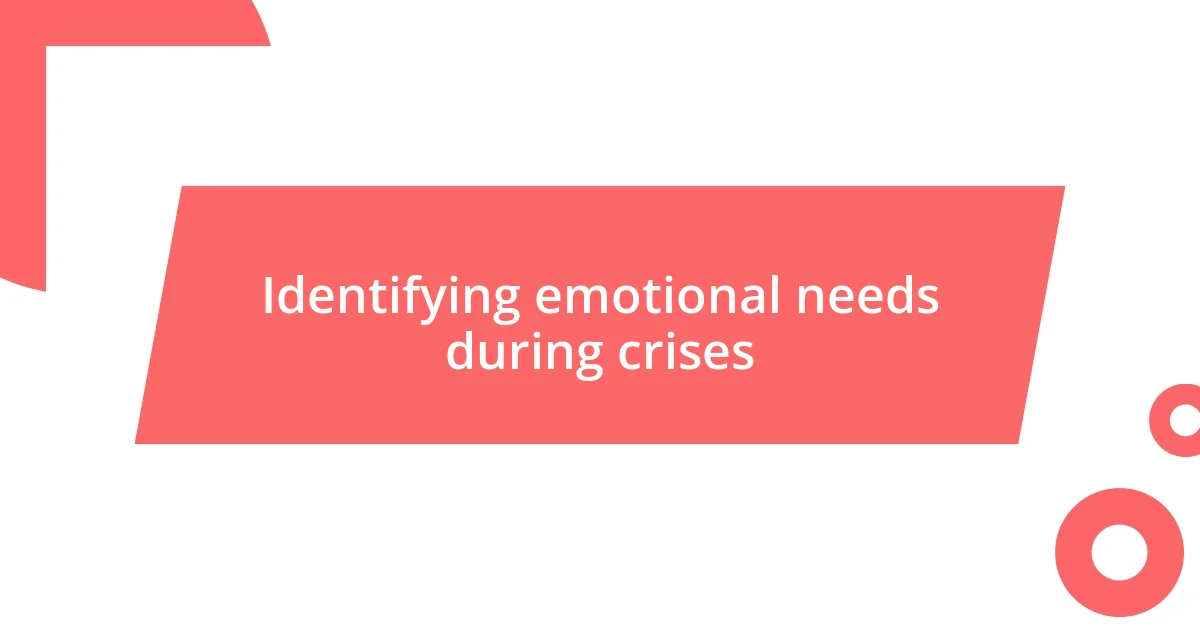
Identifying emotional needs during crises
Identifying emotional needs during crises requires a keen sense of awareness. I recall a situation during a local flood when many families were displaced. It was clear that while some needed immediate shelter and food, others craved emotional support. Being there to listen, to just sit quietly with them for a moment, often made a world of difference. Recognizing who needed what was sometimes challenging, but it highlighted the diverse emotional landscapes we navigate during crises.
Another instance comes to mind when a friend experienced a devastating loss. At first, I thought offering practical help was what they needed. However, it became evident they were longing for someone to share their memories and talk about their feelings. Just by being present and showing empathy, I realized I was meeting their emotional needs in a way that simple assistance could not. It was a powerful lesson in the importance of tuning into the unspoken words and emotions that often lay beneath the surface.
Self-awareness during these moments is often underrated. I learned to check in with my own feelings too, asking myself how I could best support others while also managing my emotional state. This dual focus not only aided my interactions but also enriched my perspective on helping others. Have you ever reflected on how you feel when you try to support someone in distress? Understanding both sides can foster deeper connections and remind us that we’re all navigating our own emotions during tough times.
| Key Emotional Needs | Examples from Crises |
|---|---|
| Emotional Support | Listening to someone’s story, validating their feelings |
| Practical Help | Providing food, clothing, or shelter |
| Connection | Gathering together, sharing grief or hope |
| Understanding | Recognizing when someone needs space vs. companionship |
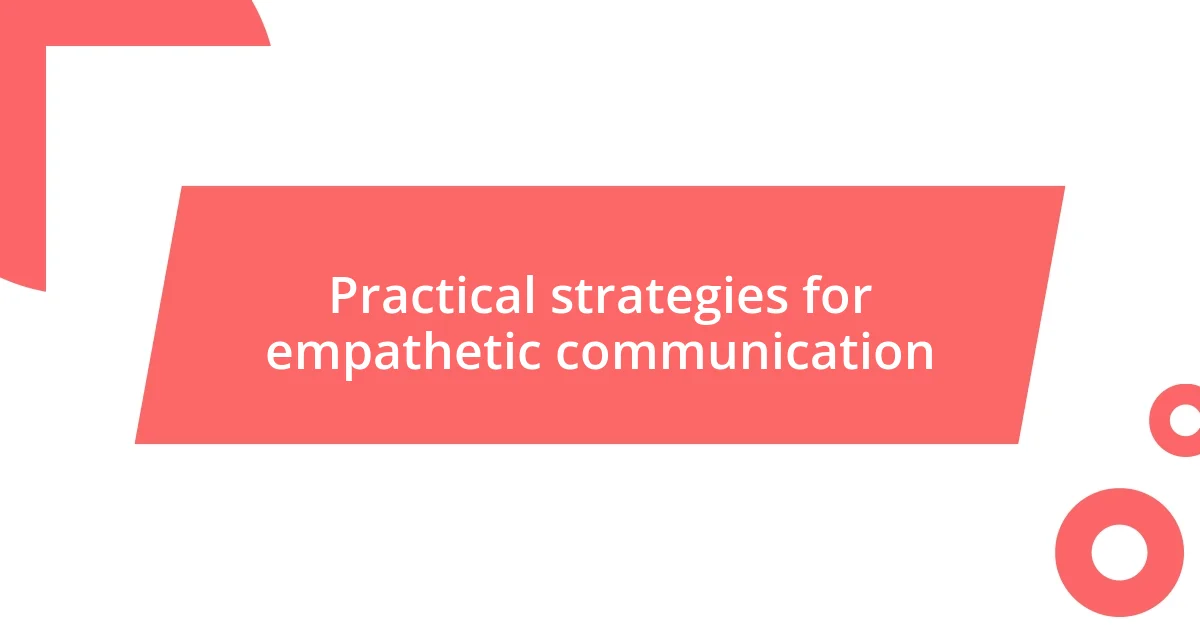
Practical strategies for empathetic communication
Effective communication during crises hinges on our ability to truly hear others. I vividly remember a volunteer shift at a crisis center where, amidst the chaos, I learned that sometimes silence speaks louder than words. I met a woman who had just lost her home; instead of trying to fix her pain, I simply sat beside her. That quiet presence allowed her to express her feelings, revealing that validating her experience was what she needed most. This taught me that empathetic communication often starts with just being there.
Here are some practical strategies for empathetic communication:
- Practice active listening: Give your undivided attention, making eye contact, nodding, and providing verbal affirmations to show you’re engaged.
- Use reflective statements: Paraphrase what the other person says to demonstrate understanding, such as, “It sounds like you’re feeling overwhelmed.”
- Ask open-ended questions: Encourage deeper sharing with questions like, “How are you coping with everything?” This opens the door for emotional expression.
- Show vulnerability: Share a small personal story that relates to their experience, helping them feel less alone.
- Respect their pace: Understand that everyone processes emotions differently; allow space for silence if they need it.
- Acknowledge their pain: Sometimes, simply saying “This is really hard” can be incredibly validating.
In times of crisis, it’s essential to remember that our words can carry immense weight. One evening, I chatted with a family who had lost everything to fire, and in a moment of overwhelming grief, I hesitated but then shared a similar experience from my own life. The acknowledgment transformed our conversation—what started as a simple exchange turned into a profound connection based on shared vulnerability. In crisis, our shared humanity often leads to the deepest conversations.
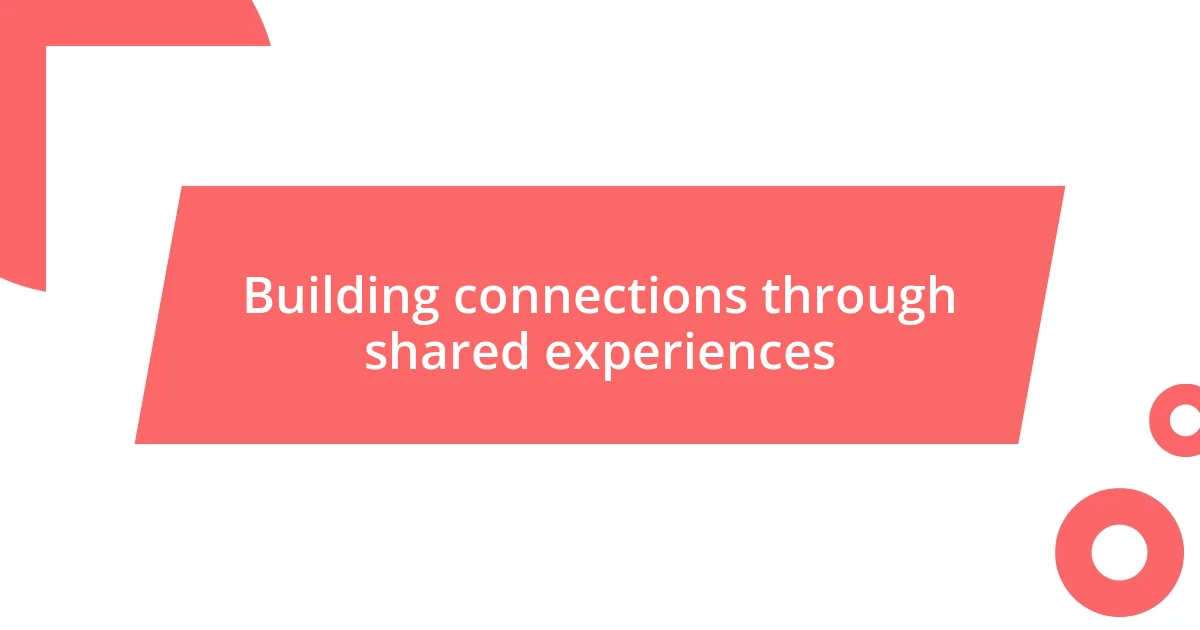
Building connections through shared experiences
Building connections through shared experiences can be incredibly powerful. I remember a time when I attended a support group after a natural disaster. As people began to share their stories, I was struck by how quickly our individual pain transformed into a collective understanding. Sharing a similar frustration or sadness allowed everyone to feel less isolated. Have you ever felt that sense of relief when you realize someone else knows exactly what you’re going through? It’s a reminder that, in these moments, our human experiences can bridge the gaps between us.
Another moment that stands out for me was during a community gathering for those affected by a crisis. I connected with a stranger over our shared love for gardening, which seemed trivial amidst the chaos. Yet, that simple topic blossomed into deeper conversations about loss and hope. It was fascinating how a shared interest could underpin our vulnerabilities, allowing us to support each other without even realizing it. Isn’t it remarkable how small commonalities can foster a sense of connection?
In reflection, I can’t help but think about the role that empathy plays in these connections. When we share our stories, we’re not just talking; we’re inviting others into our world. I once shared my own story of overcoming hardship, and suddenly, others felt comfortable revealing their own struggles. This reciprocity created a safe space for healing and understanding. Have you found that sharing your experiences can also open doors for others to do the same? In crises, our shared experiences can be the glue that holds us together, fostering resilience and comfort as we navigate uncertain waters.
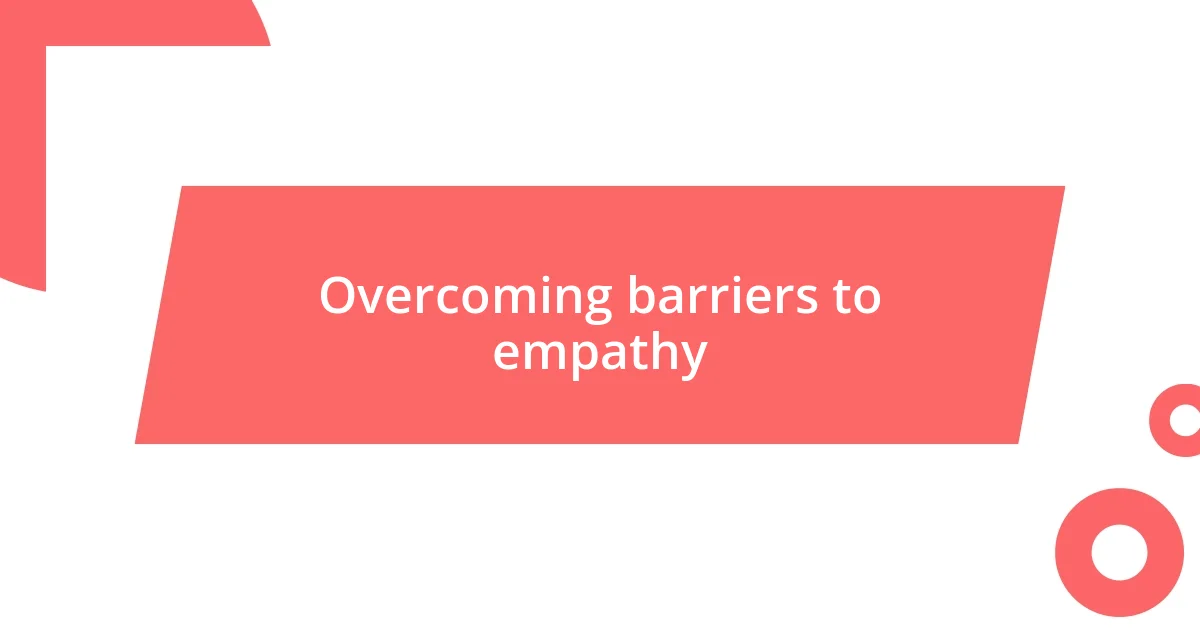
Overcoming barriers to empathy
Overcoming barriers to empathy requires us to confront our preconceived notions and biases. I recall working alongside a diverse group of volunteers during a community outreach program. Initially, I found myself hesitant to connect with those who had different backgrounds than my own, fearing that I wouldn’t fully understand their experiences. But once I opened my mind, listening without judgment, I discovered that our shared humanity far outweighed our differences. Isn’t it fascinating how stepping outside of our comfort zones can lead to such rich connections?
Another significant barrier is emotional fatigue, especially during prolonged crises. I remember a time when I felt overwhelmed while helping others cope with grief and loss. At one point, I realized I was becoming numb to their stories. To overcome this, I took a moment to reflect on my own feelings and consciously reminded myself of the passion that drove me to help in the first place. This shift—recognizing my fatigue while simultaneously reigniting my commitment—made a world of difference in how I engaged with others. Have you ever found that reconnecting with your purpose can recharge your capacity for empathy?
Lastly, let’s talk about the fear of saying the wrong thing. I’ve certainly been there, hesitating before reaching out because I worried my words might not offer the comfort intended. However, I learned that authenticity often trumps perfection. One evening, I approached a grieving father, feeling nervous but compelled to connect. I simply acknowledged his pain, saying, “I can’t imagine what you’re going through, but I’m here.” That honesty opened the door for a genuine conversation. It made me realize that, sometimes, our willingness to be vulnerable can break down the walls that keep us apart. Isn’t it powerful to think that simply being real can foster such deep understanding?
